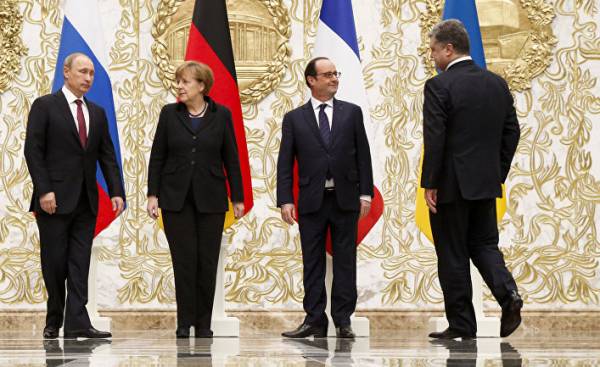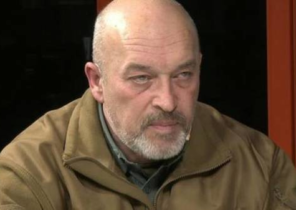
12 February marks two years since the signing of the so-called “Minsk-2”, that is document titled “Complex of measures on implementation of Minsk agreements”.
The official basis for the development of “second Minsk” became the desire of the leaders to get to work “Minsk first.” But it’s hard to argue with the fact that progress in the implementation of the Minsk agreements is still critically low.
Although we hear constantly that the rejection of the “Minsk” also has a number of challenges and risks.
This article is an attempt to answer three questions:
The term review in 2017; a wider chronological framework is unlikely to give a clear and realistic answers. And even this question is walking on thin ice: the equation has too many unknowns.
All forecasts are based on the analysis of the current positions of key players, existing and probable; how long those positions will be in force, time will tell.
“Minsk” and “Normandy”: yet in force
To date, all parties insist that the “Minsk” and “Normandy” remain in force. A clear position on this issue, as well as about the persistence of the Normandy format as a negotiation platform, expressed, in particular, Ukraine and Germany.
In 2017 Germany continues to play the role of “locomotive” of the negotiation process: on the initiative of Sigmar Gabriel, the new head of the German foreign Minister, “Norman Quartet” at the level of Ministers should meet on February 16-17 in Bonn.
The last time they met in late November of last year, a result close to zero.
German interlocutors agree that Germany is not going to reduce the pace of negotiations, especially because, with the exception of the head of the foreign Ministry, the entire body of officials responsible for the Ukrainian direction has not changed.
Diplomats of one of the countries-mediators also claim that for the preservation of the Normandy format is supported by Russia. By the way, all participants of the meeting of the UN Security Council on Ukraine on 2 February 2017, including the Russian representative referred to the Minsk agreement as the current settlement plan.
One of the key unknown is the position of France regarding the “Minsk” and “Normandy” after the presidential election.
However, whoever becomes the next President of France, she is unlikely to exit the Normandy format — the participation is to Paris primarily to the factor of cooperation with Berlin, as well as implementation of its traditionally leading positions in EU foreign policy.
The risk, however, is that some of the candidates in case of victory can be much more open to the support of the Russian vision and, thus, to disbalancement “Normandy” is not in favor of Ukraine.
However, French interviewees noted: during the war, understanding Ukraine (which before the war was perceived mainly through the Russian “points”) in political and intellectual circles has increased significantly. And this legacy will remain no matter who becomes the new owner of the Elysee Palace.
While it is unclear what are the Minsk agreement for Donald trump’s business of the predecessor (in the eyes of the new US President their discreditied), or guide policy towards the Russian-Ukrainian conflict.
So far, the signals coming from the White house, give cause for cautious optimism.
On Bank generally satisfied with the two telephone conversations between trump and Poroshenko. In addition, an important promise was that the representative to the UN, Nikki Haley during a speech at the meeting of the Security Council on 2 February 2017 called on Russia to fully implement the Minsk agreements.
However, these signals should not be overestimated.
Trump’s policy towards Ukraine and conflict is still being formed.
Uncertainty remains also the candidate who will be Ukraine and the issue of settlement — like powers and Victoria Nuland in the previous administration. The American insiders, whom the author interviewed during the preparation of this article, agree that Ukraine will have to wait and constructive compromise.
Whether these compromises are “painful” or acceptable, and it depends among other on the agenda that Ukraine will be able to offer in advance.
The continuation of the sanctions: the U.S. factor
One of the priorities of Ukrainian diplomacy this year — saving American and European sanctions against Russia.
Moreover, us sanctions are particularly important. They are much more powerful than the European: in contrast to the sectoral EU sanctions, the list of companies that fall under them, constantly updated. Thus the United States not only extra pressure on Russia, but also to help ensure their effectiveness: if sanctions do not update accordingly, sanctions usually pretty quick to find workarounds.
In addition, without the us sanctions, several European constraints, particularly financial, just don’t make sense: for example, European banks will be able to transfer money to Russia through the United States.
The first week of the presidency of Donald trump give grounds for the conclusion that he prefers to leave sanctions against Russia as a trump card in his sleeve. Key message: statement Nikki Haley that the sanctions associated with the Crimea, will be in force as long as Russia will not give Ukraine control over the Peninsula.
Thus, on assurance a press-the Secretary of the trump Sean Spicer, Haley spoke on behalf of the President.
Perhaps the vision of trump regarding the sanctions and the tough stance of partners from Europe — German Chancellor Angela Merkel and Prime Minister of the UK Theresa may.
Interesting detail: if trump is considered the opinion of leaders of some countries-members of EU, the same cannot be said about his attitude to the EU as a whole: three weeks after the inauguration of the trump not found the opportunity to talk with either the EU high representative Federica Mogherini or the President of the European Council Donald Tusk, nor the head of the European Commission Jean-Claude Juncker.
Returning to the statement Hayley, the question arises — with Crimea is clear, but how about sanctions related to the Russian aggression in the East?
So far, the solution I can suggest is that American lawyers: the fact that all four of the decree Obama, who imposed sanctions against Russia, associated with the occupation of Crimea.
The first three were issued in March 2014, when Russia’s aggression in the East was not yet, and the last in December 2014, and it is also explicitly formulated as an additional measure in response to the occupation of the Crimea. All subsequent sanctions list of individuals and entities, including those associated with aggression in the East was formed by the State Department and U.S. Treasury Department with reference to one of these four decrees.
But does the statement, Hayley, that trump is not going to reverse the Executive orders Obama or reduce the sanctions lists — this surely knows is that the trump.
But even if the American President and has a certain position, for this reason now, this does not mean that it can’t change tomorrow.
As noted by his press Secretary Spicer in an interview, “the reason trump is so successful as a negotiator is that he keeps all options open (in the original “keeps everything on the table”), so nobody knows what to expect.”
It is also evident that the decisive role in maintaining the sanctions can play Congress. In particular, if in both chambers this year will be able to have a bill on the fixing of sanctions at the legislative level (as it is known, last year a similar bill was never put to a vote in the Senate) and to push through Congress “The Russia Sanctions Review Act” requiring the approval of any easing of sanctions against Russia at the level of congressmen. The relevant bills were registered in both chambers February 8 senators of both Republican and Democratic parties.
European Union: floppy unity
If the United States the issue of sanctions is to select, “shrink or expand” that for the EU the question is how “to renew or not to renew”.
That is, we can talk about the halt of sanctions.
This is especially true of sectoral sanctions tied to the implementation of the Minsk agreements, which the EU is reviewing every six months, starting in December 2015.
While sometimes you can hear the outrage, they say, is why the sanctions do need to revise instead of just bind them to restore the territorial integrity of Ukraine, representatives of various EU institutions have repeatedly told the author of these lines: no one expected the twenty-eight member States will be able to maintain unity on sanctions so long.
The last time sanctions were extended in December 2016, and the next revision is scheduled for June 2017. While in Brussels, I assure you that as at today in the EU-28 remains United on further sanctions — have led to this and the recent escalation on the line of demarcation.
The EU is not ready to expand sectoral sanctions — interlocutors in Brussels recognized that a coherent package of sectoral sanctions are just afraid to touch that in the process of negotiation negotiation is not used by those who would like to reduce it.
Thus, in the short term you can gently talk about maintaining the status quo at the diplomatic level. This does not mean that Ukraine should just wait for the other players to determine the positions. Restart the power in the partner countries is also a “window of opportunity” for Ukraine, for advocacy of their position.
Perhaps that is narrow and limited — but not to use it Ukraine has no right.






